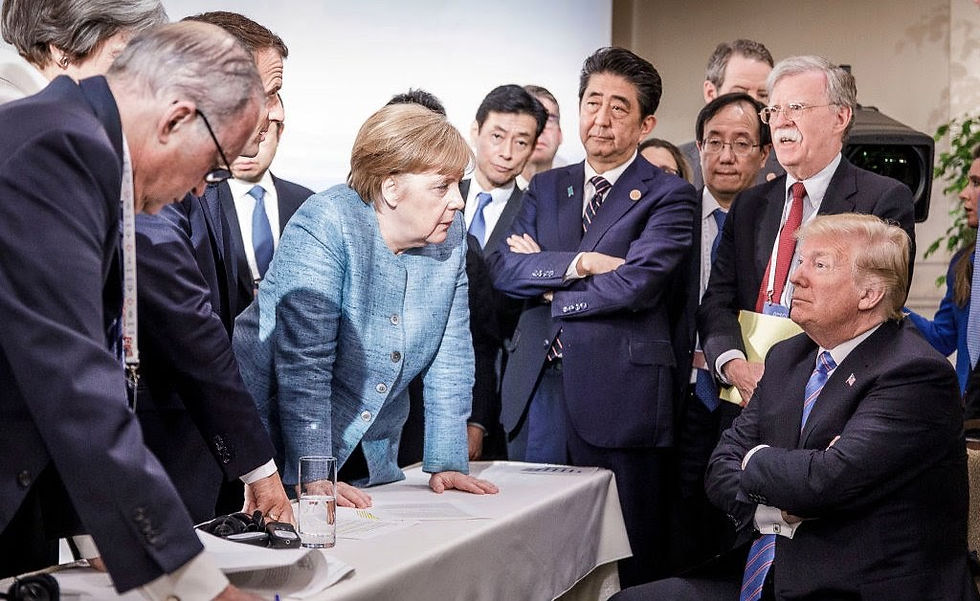Europe’ Stockholm syndrome
Geopolitics of the EU n.2
As Biden awaits to be crowned President of the United States, let's take a look at what has been of the EU-US relations in the last 4 years and what we should expect from the incoming administration.
Two fundamental premises need to be made before talking about the Transatlantic relationship between Europe and the United States of America.
Premise 1. There is a sharp difference between the narrative around which a relationship is built and the concrete actions which truly define the relationship. Nonetheless, both variables are tightly interconnected and each one influences the other.
Premise 2. Although the relationship between the EU and the US is described as an alliance, in reality it’s better represented as a client-hegemon dependency rather than a cooperation between peers. This of course doesn’t mean that Europe is completely reliant on the US on every aspect, but it certainly demotes EU’s hypothetical geopolitical independence to a narrower geopolitical autonomy.
As you can see from the picture above, apparently a substantial majority of Europeans prefer Biden over Trump as president of the United States, with Poland being the only EU country with uncertain results. This general mistrust in the Trump presidency seems to be accompanied by a widespread negative opinion of the US (as depicted in the second picture).
These figures are far from being surprising, president Trump’s attitude towards US’ allies has never been conciliatory and at times even disrespectful up to the point where he stigmatized NATO as “obsolete”, furiously accused the EU of inaction and went as far as labelling the Union as a “foe”. Clearly none of that has led to a breakup of the Transatlantic Relationship and it certainly won’t once Biden takes office in January. However, Trump’s hostile rhetoric and commercial aggressiveness towards the EU did sort some minor, yet possibly significant, effects. True, as I said no structural aspect of the bilateral relation was actually affected, but something else experienced a crucial upheaval: during these past four years the narrative changed completely, and it changed on both sides of the Atlantic Ocean.

As a response to the White House’s tone shift, Europe too started using a different rhetoric. We’ve seen an unusual Angela Merkel calling for Europeans to “take our fate into our own hands”, president Macron defined NATO as “brain dead” and on multiple occasions advocated the creation of a European army, an idea then endorsed by Chancellor Merkel. Ultimately, nothing came out of these statements, particularly because not even German and French leaders truly believed in what they were saying. The idea of Europe standing up for itself and stop relying on the US for its own defense is still widely regarded as absurd, Europeans are too accustomed to their economic wellbeing to worry about their geopolitical status. The Americans know this far too well and so does Trump, who took advantage of this weakness and started bullying US’ allies into accepting a greater share of America's burden, but with no intention of sharing its power. Nothing new under the sun, Trump’s predecessor was the first to identify China as America’s new archnemesis (the so called “Pivot to Asia”), Obama wanted to make sure that the Superpower’s most valuable junior partner was up to the challenge and wouldn’t fall to Russia while America was busy in the Indo-Pacific region. As Trump came to the White House, while the strategy stayed the same the narrative took a U turn.
Europe has neither the strength nor the will to become a superpower, it chooses to be safe rather than powerful. Resigned to the idea of being in retirement, having lost its independence decades ago, the Old Continent is hopeful the transition of power in Washington will restore its trust in the United States. But the Trump experience did actually leave some marks on Europe’s consciousness, in the halls of power of the European capitals diplomats and government officials started asking questions they never dared to say out loud: “What if now we have to fend for ourselves?”. These doubts will keep echoing across the Continent even after the president-elect has walked through the door of the Oval Office, when the narrative will change once again and the American strategy will remain unchanged. Let us hope we will keep asking these questions until we fully realize that Europe’s best ally is Europe itself.
















Comments